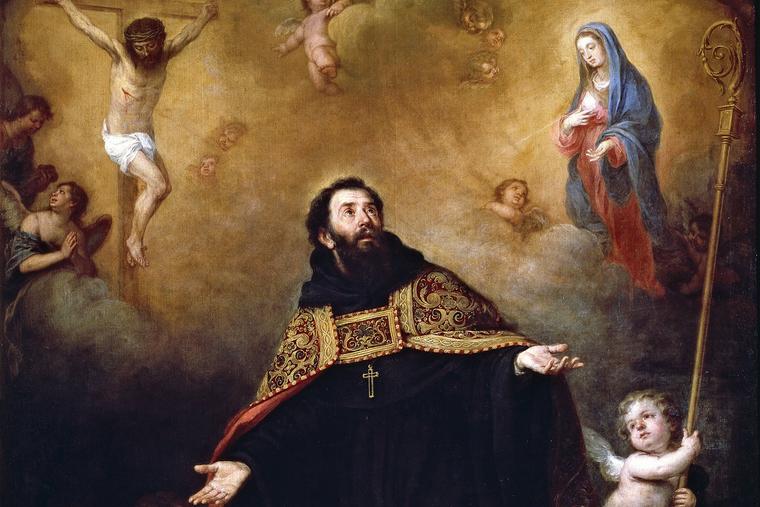To See All Things Under Eternity’s Aspect
The avoidance of sin, the attraction to God — such is the defining drama of the life of man

Counted among the Seven Gifts of the Holy Ghost foretold by the prophet Isaiah eight centuries before the coming of Christ (11:2-3) — who would set about perfectly fulfilling the promise of each — is the Gift of Understanding, a sublime treasure entrusted to the Bride whom Christ came to seek and to wed.
First infused into the soul by Baptism, then sealed in the Sacrament of Confirmation, it enables one to see into the very heart of things, thereby discerning the mysteries of life and death from the vantage point of God. The soul, in other words, is blest to perceive all that is happening to it in relation to eternity. Everything seen and understood sub species aeternitatis.
Seems straightforward enough, doesn’t it? I never quite saw the connection, however, until I heard the late Father Benedict Groeschel tell the story of Angelica, an 80-year-old Hispanic woman, who had for years been going to the friary in the South Bronx to help out. One day, he told us, she simply announced that she would not be coming back. She’d be going instead to the bank, taking out all her money, then going to her friend Rosita’s house where they’d play some flamenco music. After which, she would die.
“Now that’s the Gift of Understanding!” exclaimed Father Benedict.
But it isn’t only old Hispanic women, who, having received a special insight telling them that the end is near, long for one last dance. An old bishop of Hippo by the name of Augustine, in the last days of his own life, and knowing that death was fast closing in, took to his bed and, while looking upon copies of the Seven Penitential Psalms he’d placed upon the wall, began slowly to read them over and over until God called him home.
That too was evidence of an understanding to which only the Spirit holds the key.
Pope Benedict, in a moving passage about those last days, tells us that Augustine, in sensing the approach of death, resolved that the time had come, as it were, “to ‘excommunicate’ himself, and undertake public penance. In his last days he manifested his solidarity with the public sinners who seek for pardon and grace through the renunciation of communion. He wanted to meet his Lord in the humility of those who hunger and thirst for righteousness, for him who is the Righteous and Merciful One.”
There are times, it seems, when we especially need to feel such hunger, to suffer the pain of renunciation, “if we are to come fresh to the Lord’s gifts and understand the suffering of our hungering brothers. Both physical and spiritual hunger can be a vehicle of love.”
How fitting, then, that Augustine should choose particularly to pray those psalms, immersing himself in the sorrows of the fallen and repentant king who composed them. David, who, evincing great hunger and thirst for righteousness, beseeches God to blot out all his transgressions, “according to the multitude of thy tender mercies.” Sunk in abjection, he turns to God with honest and heartfelt sorrow. “Wash me thoroughly from mine iniquity,” he pleads, “and cleanse me from my sin.”
And knowing well the terrible wickedness he had done to poor Uriah in his lust for Bathsheba, his wife, he has reason enough to repent, to long for the atoning grace to which those Penitential Psalms (Psalms 6, 32, 38, 51, 102, 130 and 143) give such profound and heartfelt expression.
“Hide thy face from my sins,” he cries out in Psalm 51, “and blot out all mine iniquities.” Thus does David sound the depths of his own brokenness:
For I acknowledge my transgressions; and my sin is ever before me. Against thee only have I sinned, and done this evil in thy sight …
And knowing that his sin is ever before him, done in the sight of one who sees all, the psalmist begs God for a new heart, a heart steeped in the pure and pellucid waters of God’s own life, the abounding goodness of his being, that he might then “teach transgressors thy ways; and sinners shall be converted unto thee.” But it will not happen because so many burnt offerings are made, ritually slaughtered, then dutifully and sent up to God, whose anger will somehow be deflected by the sheer number of dead animals. These give no pleasure to God whatsoever. “The sacrifices of God are a broken spirit; a broken and a contrite heart, O God, thou wilt not despise.”
Behold, thou desirest truth in the inward parts: and in the hidden part thou shalt make me to know wisdom.
Purge me with hyssop, and I shall be clean: wash me and I shall be whiter than snow.
Create in me a clean heart, O God; and renew a right spirit within me.
Cast me not away from thy presence; and take not thy holy spirit from me.
Restore unto me the joy of thy salvation; and uphold me with thy free spirit.
If the one thing we most need in taking leave of this life is that we ensure safe passage into the next, then the thing we must fear above all is sin, which seeks at every turn to thwart our getting home to God at all. The avoidance of sin, the attraction to God, such is the basic and defining drama of the life of man, concerning which the psalms, especially those seven, provide perfect penitential edge. So, let us have frequent recourse to them, allowing the Holy Ghost — who, as the poet Hopkins reminds us, “over the bent world broods with warm breast and with ah! bright wings” — to fill us with such understanding of the things of God that all waywardness will be swept ever more effortlessly away.
















